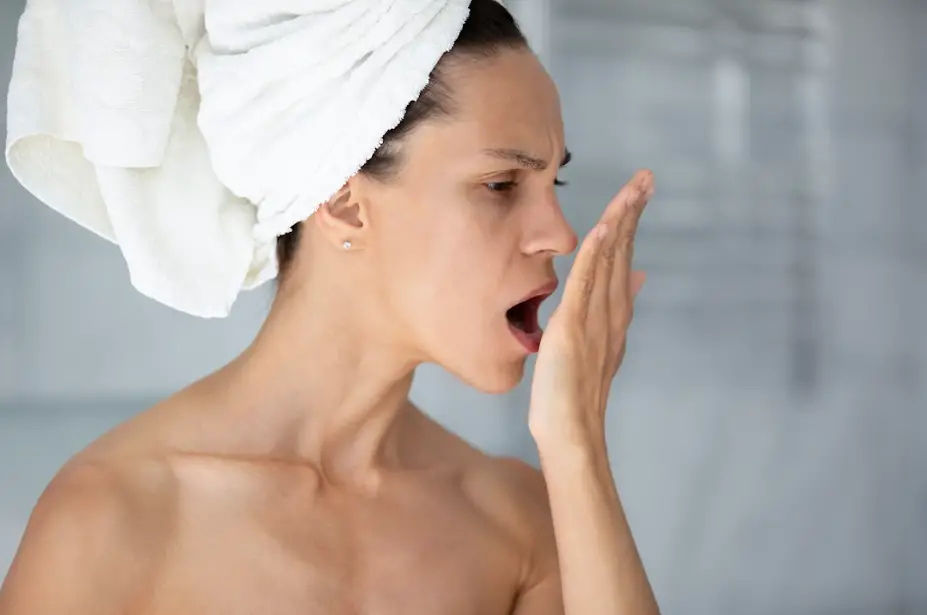Bad breath, also known as halitosis, is a prevalent issue affecting numerous individuals. It can stem from a variety of factors, such as inadequate oral care, dry mouth, specific dietary choices, tobacco consumption, and underlying health conditions. Fortunately, several effective remedies are available to combat bad breath and maintain fresher breath.

If you’re looking for a trusted dental practice in the area, consider Grand Peaks Dental. They offer comprehensive dental services and can help you address any oral health issues contributing to bad breath.
Improve Oral Hygiene
Maintaining good oral hygiene is one of the most effective ways to fight bad breath. Correct brushing and flossing methods can diminish the accumulation of food particles, plaque, and bacteria responsible for bad breath. Follow these tips:
- Brushing Teeth
- Use a soft-bristled toothbrush and fluoride toothpaste.
- Brush for at least two minutes twice daily (morning and night).
- Follow a systematic approach, dividing your mouth into quadrants, and brush each section thoroughly.
- Use gentle circular motions to clean the outer, inner, and chewing surfaces of your teeth.
- Flossing
- Floss once a day, preferably before brushing.
- Use 18 inches of floss, wrapping the ends around your middle fingers.
- Gently guide the floss between your teeth using a gentle rubbing motion.
- Curve the floss against one tooth, making a C-shape, and gently move it up and down against the tooth and under the gumline.
- For every tooth, ensure that you use a fresh segment of floss, repeating the process to guarantee thorough cleaning as you progress.
- Mouthwash
- Use a mouthwash to eliminate bacteria and freshen your breath.
- Look for a mouthwash with cetylpyridinium chloride, essential oils, or chlorhexidine gluconate.
- Swish the mouthwash around in your mouth for at least 30 seconds, making sure to reach all areas.
- Avoid swallowing the mouthwash, as it can be harmful if ingested.
- Tongue Cleaning
- The tongue can harbor a significant amount of bacteria and debris. Use a tongue scraper or a soft-bristled toothbrush to gently remove the yellow or white coating on your tongue.
- Start at the back of your tongue and gently pull the scraper or brush forward, removing debris and bacteria.
- Rinse your mouth after cleaning your tongue.
By following these oral hygiene steps consistently, you can significantly reduce odor-causing plaque, food particles, and bacteria. Remember, proper oral hygiene promotes overall dental health by preventing tooth decay and gum disease.
Hydrate Properly
Dry mouth, also known as xerostomia, can contribute to bad breath. Saliva helps wash away food particles and neutralize odors, so staying hydrated is important. Here are some tips to combat dry mouth:
- Drink plenty of water throughout the day.
- Chew sugar-free gum or suck on sugar-free hard candies to stimulate saliva production.
- Avoid alcohol, caffeine, and tobacco, as they can dry out your mouth.
Address Underlying Health Conditions
Certain health conditions—such as sinus infections, tonsillitis, acid reflux, and diabetes—can contribute to bad breath. If you suspect an underlying health issue is causing your bad breath, it’s important to consult with your healthcare provider for proper diagnosis and treatment.
Make Dietary Changes
Certain foods and beverages can contribute to bad breath. Here are some tips to help with bad breath:
- Avoid eating strong-smelling foods, like garlic, onions, and spicy dishes.
- Limit your consumption of dairy products, as they can leave an odor.
- Drink green tea, which has natural antibacterial properties that can keep your breath fresh.
Use Natural Remedies
In addition to traditional remedies, several natural remedies can help freshen your breath:
- Chew on fresh parsley, mint leaves, or fennel seeds with natural breath-freshening properties.
- Drink a glass of water mixed with a teaspoon of baking soda and a pinch of salt. This can help neutralize odors and promote fresher breath.
Try Probiotics And Breath Fresheners
Probiotics, which are live beneficial bacteria, can help promote a healthy balance of microorganisms in your mouth, reducing the growth of odor-causing bacteria. Consider incorporating probiotic-rich foods like yogurt, kefir, and fermented vegetables into your diet.
Additionally, various breath freshening products—such as mints, sprays, and strips—are available on the market. While these can provide temporary relief, it’s important to address the underlying causes of bad breath for long-term solutions.
Quit Smoking
Smoking can cause bad breath and negatively affect oral health. Tobacco products not only leave a persistent odor in the mouth but also contribute to the onset and progression of gum disease, which can worsen halitosis.
By refraining from tobacco use, individuals can notably reduce plaque and tartar buildup, resulting in fresher breath and a healthier oral environment. Abstaining from smoking diminishes the risk of oral cancer, a condition often associated with chronic bad breath and other severe health consequences.
Regular Dental Checkups
Visiting your dentist regularly is crucial for maintaining good oral health and preventing bad breath. During these visits, your dentist can identify and address any underlying dental issues causing your bad breath, such as cavities, gum disease, or other oral health problems.
Maintaining Fresh Breath Daily
Combating bad breath is an ongoing process that requires consistent effort. Here are some daily habits to help you maintain fresher breath:
- Brush and floss regularly, as mentioned earlier.
- Rinse your mouth with water after eating, especially if you’ve consumed foods that can cause bad breath.
- Carry breath mints, gum, or a small bottle of mouthwash with you for quick breath freshening on the go.
- Stay hydrated by drinking plenty of water throughout the day.
Key Takeaways
Bad breath can be a socially awkward concern and cause discomfort, but it’s often preventable and treatable. By adopting good oral hygiene habits, addressing underlying health conditions, making dietary changes, and incorporating natural remedies, you can effectively combat bad breath and enjoy fresher breath.
Consistency is key, and regular dental checkups can help identify and address any persistent issues. With the right approach, you can confidently engage in social interactions without worrying about unpleasant breath.



